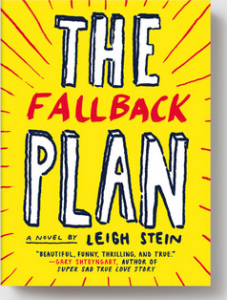Author Spotlight
Interview with Leigh Stein (3 and 4)
 Leigh Stein’s meaningful first novel, The Fallback Plan, is about a girl named Esther who has just graduated from college and is feeling aimless and depressed, which, okay, sounds like a well-visited premise for a novel. But Esther is so witty and likable that you can’t help enjoying her mild misadventures. I’ve been emailing a question to Leigh every day this week, but yesterday she was caught up on her book tour (is she in your town?), so here are two questions
Leigh Stein’s meaningful first novel, The Fallback Plan, is about a girl named Esther who has just graduated from college and is feeling aimless and depressed, which, okay, sounds like a well-visited premise for a novel. But Esther is so witty and likable that you can’t help enjoying her mild misadventures. I’ve been emailing a question to Leigh every day this week, but yesterday she was caught up on her book tour (is she in your town?), so here are two questions
HTMLGIANT: Can I tell you something? Why is the novel so funny? Or, seriously, what was the writing process like? How many revisions did it take to get all the jokes in there? Like, “A small part of me threw up.” Or making a confused facial expression to trick the IPASS sensor, or a mom with a “hairstyle most conducive to storing pencils” instead of one who says “well look at that” when you show her how to enlarge the type in MS Word.
LEIGH: Esther makes jokes as a way of pricking the bubble of despair and stagnation she lives in, because that’s what I do. I wrote a lot of the book while living in Albuquerque on a romantic whim, and I remember going to a health clinic to get anti-anxiety medication (because I couldn’t get an appointment with a real psychiatrist for months), and feeling so belittled and small, that I went home and wrote the scene with Esther at the doctor. She’s making jokes in her head to cover up how bad it feels to be treated like her problems don’t really matter, when to her they feel as significant as a brain tumor. Throughout the book, Esther jokes about her desire to become disabled…some people have read this as insanely self-absorbed, but for a depressed person: there’s no outward expression of how bad it feels inside. You’re not missing a leg. You get met with incredulity constantly. Are you sure it hurts that badly? Actually yes. Yes it does.
Some jokes got better during revisions. I remember meeting with my editor Dennis Johnson before revisions started, and him saying the book was basically in good shape, and that there’d probably only be minor edits. “Like putting in better jokes?” I said. One of the things he asked me to change in the book is the anti-Semitism. Jack, the romantic lead, teases Esther for being Jewish. To me, it’s a consensual teasing. But I added some jokes to buffer it. Like in this scene in the first chapter:
Jack stared at me without blinking. “How much money do you have,” he finally said.
“None. I don’t have a job.”
“Get one, Jew,” he said.
“L’chaim,” I mumbled, celebrating nothing. To Jack, I wasn’t Natalie Wood. I was Yentl. I was the ethnic diversity in the room.
Also, May, the four-year-old, is one of the few characters who is not based on anyone I knew in real life, but I did once have a four-year-old in my drama classes, who I stole the May catchphrase from. “Can I tell you something?” she would say, and then follow it up with another question. She was adorable.
HTMLGIANT: And were you a poet first, or did you just happen to publish poetry first?
LEIGH: I feel like being a poet is part of my identity, and writing prose is just something I can do. Like many young women, I’ve been writing poems since I was 13 but then I just … didn’t stop. Luckily, I got better. I think getting poetry published is easier, because it’s just faster to write and so there’s more of it. You can send 8 poems out to 6 different places, and it’ll land somewhere. But I don’t write short fiction, at least not right now. So it’s a novel or nothing. See you in five years! The sad thing is that the more prose I write, the less poetry I write. It feels like my brain is changing. Or like I can’t tune in to the same radio station anymore.
Tags: leigh stein

I really like the way you’re breaking up this interview. It’s good.
I like the way you like it.